Did you know that according to the American Academy of Dermatology, over 80 million men and women in the United States struggle with some form of hair loss? While genetics play a role, lifestyle, stress, and nutrition also contribute. For centuries, people have turned to natural remedies in search of thicker, stronger hair. One surprising hero that has recently gained attention is something you likely already have in your kitchen—the humble onion.
Onion juice may not sound glamorous, but countless people swear by its ability to support hair growth. Rich in sulfur, antioxidants, and enzymes, onion juice has been used in folk remedies across Asia and Africa for generations. The question is, does it actually work? And if so, how do you prepare and apply it safely at home without turning your bathroom into an onion-scented space?
In this article, you’ll discover the science behind onion juice for hair growth, how to prepare it step by step, different application methods, success stories, and important precautions. By the end, you’ll know whether this natural approach could be your secret to healthier, fuller hair.
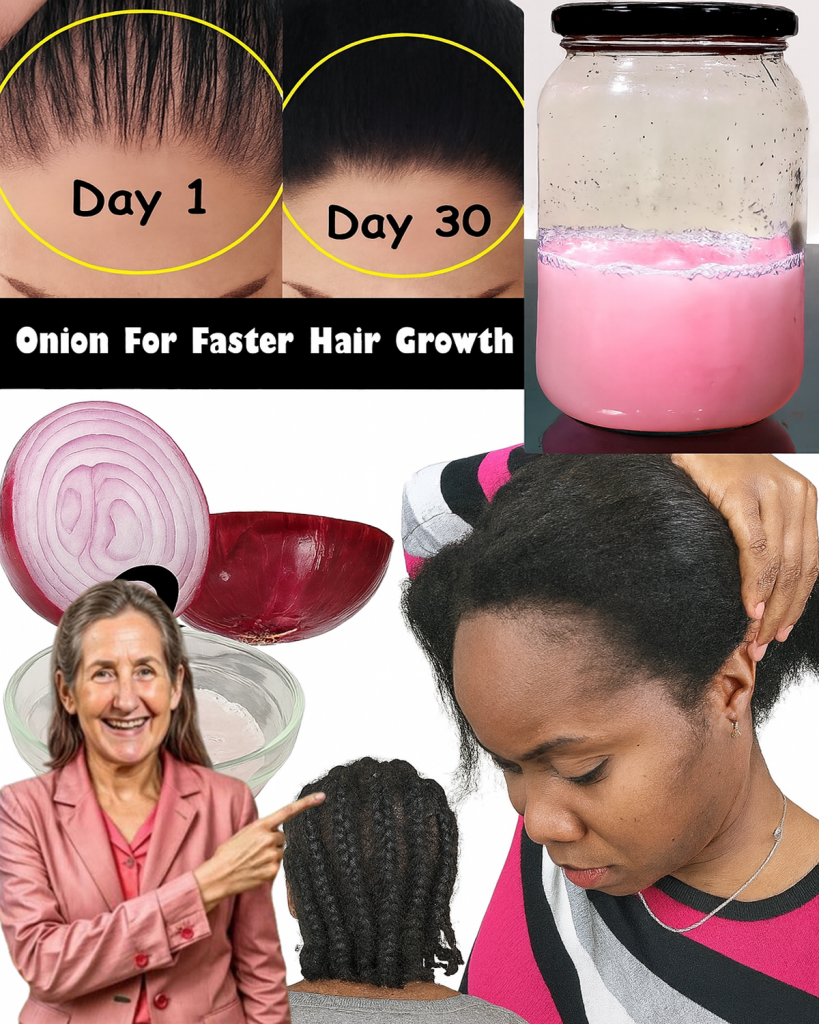
Why Onion Juice for Hair Growth?
Nutritional Profile of Onion Juice
Onions are packed with nutrients that may contribute to hair health:
| Nutrient | Role in Hair Health |
|---|---|
| Sulfur | Strengthens hair shafts, promotes collagen production |
| Antioxidants (Quercetin) | Reduces oxidative stress on hair follicles |
| Vitamin C | Supports collagen synthesis |
| Enzymes | May help reduce scalp inflammation |
The Science Behind It
Several small studies have suggested that onion juice may help stimulate hair regrowth, especially in cases of alopecia areata (a condition causing patchy hair loss). The high sulfur content improves blood circulation to the scalp, delivering nutrients to hair follicles. Antioxidants in onions also combat free radicals, which may damage follicles and slow growth.
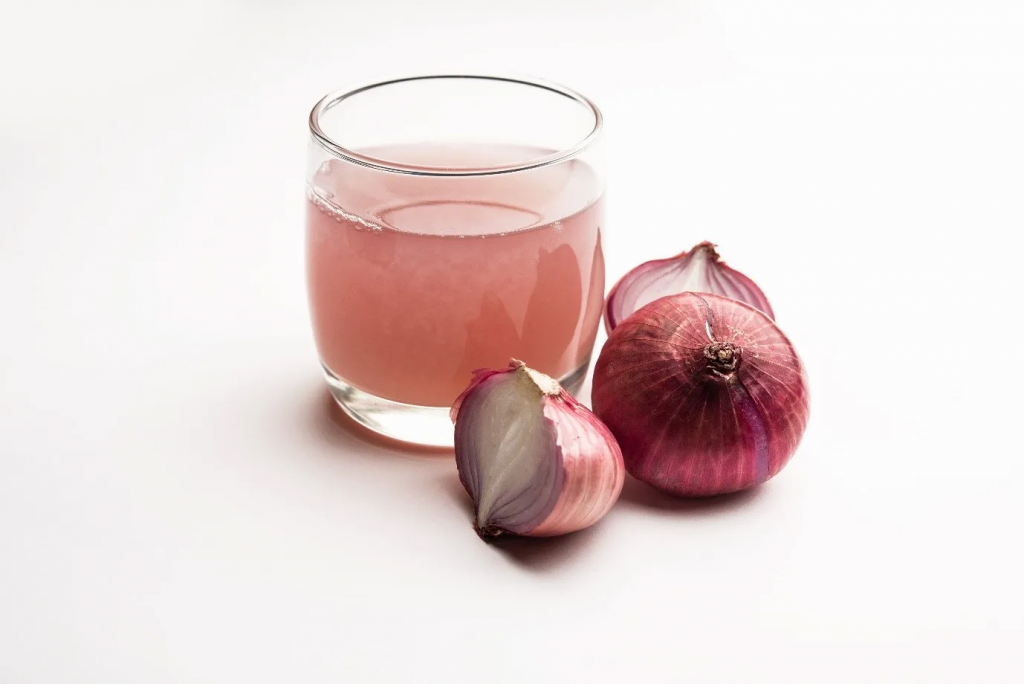
Traditional Wisdom Meets Modern Curiosity
For generations, families in India, Africa, and the Middle East have used onion juice rinses as a natural tonic for the scalp. What was once grandma’s kitchen secret is now a viral topic on YouTube, TikTok, and wellness blogs worldwide.
How to Make Onion Juice for Extreme Hair Growth
Ingredients
- 2–3 medium onions (red or yellow onions are most commonly used)
- A blender, grater, or juicer
- A fine mesh strainer or cheesecloth
- Optional: a few drops of essential oil (lavender, rosemary, or peppermint to mask the smell)
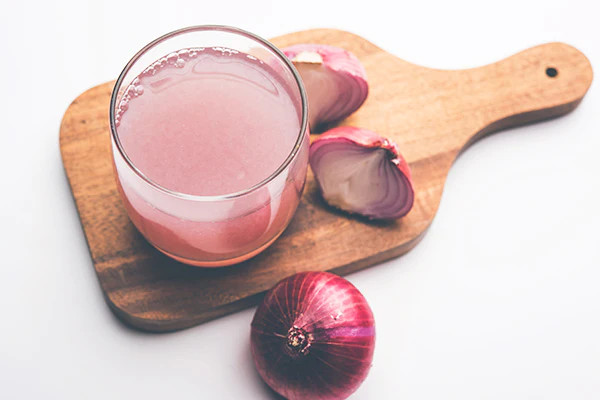
Step-by-Step Method
- Peel the onions and chop them into small pieces.
- Blend or grate the pieces until you get a pulp.
- Strain the pulp through a cheesecloth or fine sieve to extract the juice.
- Collect the juice in a clean container.
- Add a few drops of essential oil if desired to reduce the strong smell.
Storage Tips
- Store in an airtight glass jar in the refrigerator.
- Use within 3–5 days for maximum freshness.
How to Apply Onion Juice to Your Hair
Direct Scalp Massage
- Apply freshly prepared onion juice directly to the scalp.
- Massage gently in circular motions for 5–10 minutes.
- Leave it on for 30–45 minutes.
- Rinse thoroughly with a mild shampoo.
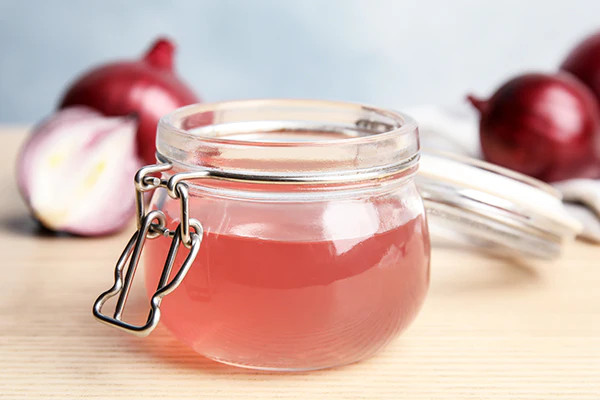
Onion Juice Hair Mask
Combine onion juice with:
- Coconut oil: adds moisture and reduces dryness.
- Aloe vera gel: soothes the scalp and reduces irritation.
- Honey: provides extra shine and hydration.
Frequency of Use
- 2–3 times per week is often recommended for noticeable results.
- Consistency is key—results may take 4–8 weeks of regular use.
Real-Life Stories and Case Studies
Case 1: The Patchy Hair Problem
A 32-year-old woman dealing with postpartum hair thinning began using onion juice mixed with coconut oil twice weekly. After six weeks, she reported reduced shedding and visible baby hairs along her hairline.
Case 2: Men and Hairline Recovery
A man in his early 40s struggling with a receding hairline used onion juice scalp massages three times a week. Though results varied, he noticed his hair looked thicker and shinier after two months.
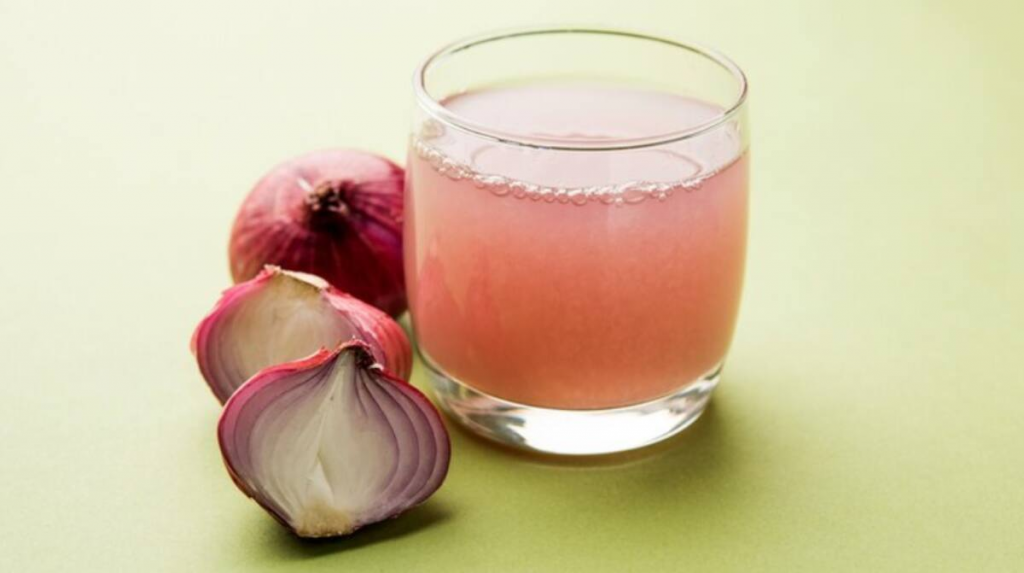
Case 3: The Consistency Factor
Another user shared on a wellness forum that she tried onion juice for two weeks but gave up due to the smell. She resumed months later with added lavender oil and found it much easier to continue consistently, which led to gradual improvements.
These experiences highlight that onion juice may not be a miracle cure, but when used regularly, it can support scalp health and hair density.
Common Concerns and Precautions
- Smell: Onion juice has a strong odor. Mixing it with essential oils helps mask it.
- Skin Sensitivity: Always do a patch test before applying. Some people may experience itching or redness.
- Scalp Conditions: If you have eczema, psoriasis, or open wounds, consult a dermatologist before use.
- Medical Hair Loss: Onion juice should not replace medical treatments for conditions like androgenetic alopecia.
Onion Juice vs. Other Natural Remedies
| Remedy | Benefits | Limitations |
|---|---|---|
| Onion Juice | Stimulates follicles, improves circulation, rich in sulfur | Strong odor, may irritate sensitive skin |
| Aloe Vera | Soothes scalp, reduces dandruff | Limited impact on growth alone |
| Castor Oil | Thickens and nourishes hair | Heavy texture, difficult to wash out |
| Rosemary Oil | Shown to support regrowth in studies | Needs consistent use |
Onion juice pairs well with these remedies when used in combination for a more holistic hair care routine.
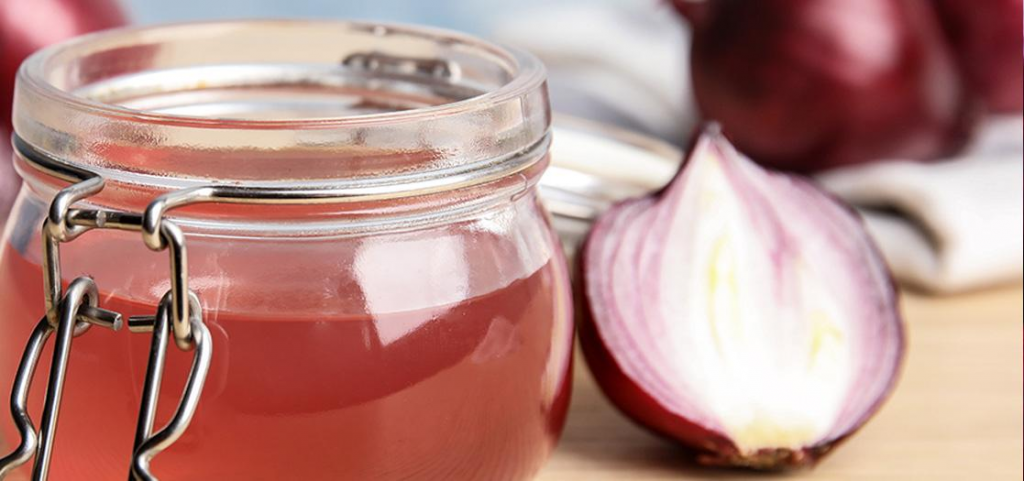
Conclusion
Onion juice may not win awards for fragrance, but it has earned a loyal following as a natural remedy for promoting hair growth. Its sulfur-rich compounds, antioxidants, and scalp-nourishing effects make it an affordable and accessible option for anyone seeking fuller, healthier hair.
Key Takeaways
- Onion juice can support hair growth when applied regularly.
- Preparation is simple, and results usually appear after consistent use.
- Combining onion juice with oils, aloe vera, or honey can reduce odor and enhance benefits.
- Always test for skin sensitivity and consult a professional if you have underlying scalp conditions.
This content is for informational purposes only and is not a substitute for professional medical advice. Always consult with a dermatologist or healthcare provider before starting new hair care treatments.




